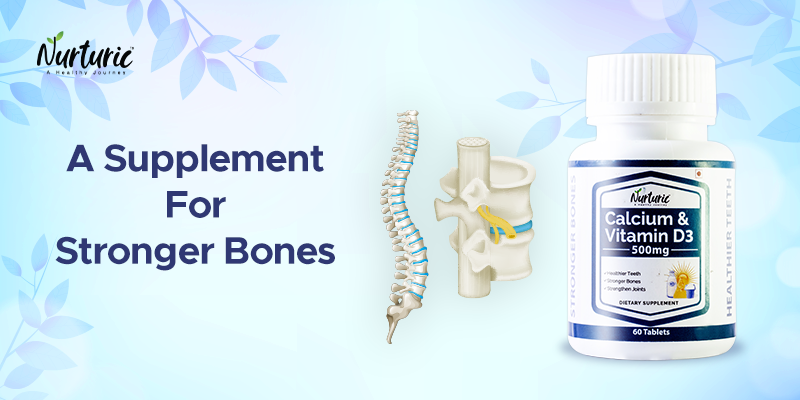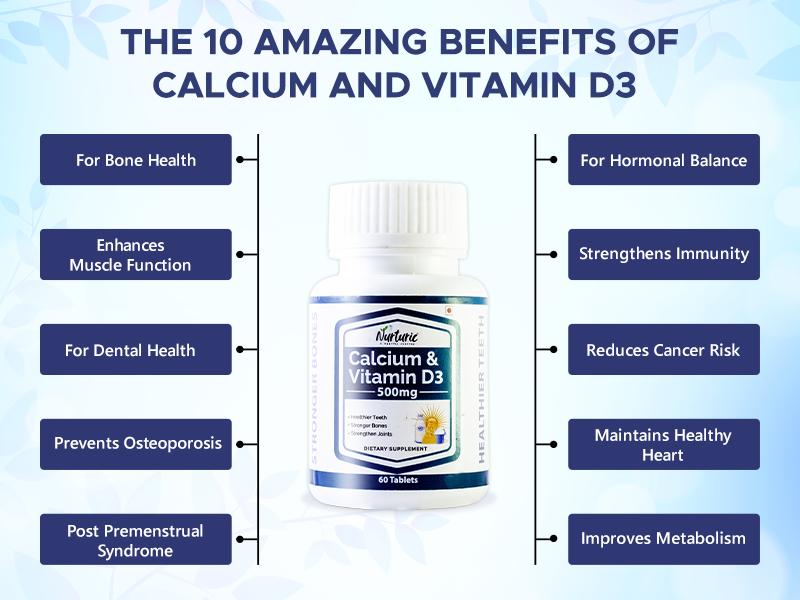- You have no items in your shopping cart
- Subtotal: ₹0.00
Nowadays, calcium and vitamin D3 supplements have become part of our life. Bones are a living part of your body, hence, they require regular nourishment to function properly and support your body throughout life. Calcium and vitamin D3 from a healthy, balanced diet can help your bone health no matter how old you are. Calcium and Vitamin D3 are two bone-building nutrients long been recognised for their importance in maintaining bone health. On a diet chart, calcium is always emphasised as every cell in our body needs calcium in some form. Calcium is the primary building material for bone development.
Calcium and Vitamin D3 are two bone-building nutrients long been recognised for their importance in maintaining bone health. On a diet chart, calcium is always emphasised as every cell in our body needs calcium in some form. Calcium is the primary building material for bone development.
Let us talk about why we need calcium and vitamin D3 and why it is essential to our bodies.
What do we know about Calcium and Vitamin D3?
Calcium and Vitamin D3 are dietary essentials in day to day life. Calcium is required for normal nerve, cell, muscle and bone function, whereas vitamin D3 is required in calcium absorption in the body. To comprehend calcium with vitamin D3 tablets, we need to understand first the relationship between the two. Calcium and vitamin D3 play critical roles in bone development.  We can quickly get calcium from food, but our bodies only allow a certain amount of calcium in our blood. When the calcium level in our blood falls, our parathyroid glands release a parathyroid hormone (PTH) hormone. This hormone activates Vitamin D, which then aids your body’s absorption of calcium from the intestine. We get the required amount of calcium for bone health in this way.
We can quickly get calcium from food, but our bodies only allow a certain amount of calcium in our blood. When the calcium level in our blood falls, our parathyroid glands release a parathyroid hormone (PTH) hormone. This hormone activates Vitamin D, which then aids your body’s absorption of calcium from the intestine. We get the required amount of calcium for bone health in this way.
Now that we know about calcium and vitamin D3 let us look at the 10 Benefits Of Calcium and Vitamin D3 – For Strong Bones and Joint Health.
10 Reasons Why You Need Calcium and Vitamin D3
Many of us do not get enough calcium and vitamins from our diet, so supplements come into play. We need calcium and vitamin D3 for knee pain, and to maintain healthy bones, muscles and the flexibility of joints. We lose calcium through our skin, sweat and urine throughout the day. As the body cannot produce calcium independently, we must include enough calcium in our diet and vitamin D from sunlight.  The deficiency of calcium and vitamin weakens bones. Nowadays, most people prefer calcium and vitamin D3 supplements to increase bone strength and reduce fractures. Let’s talk about the benefits of calcium and vitamin D3.
The deficiency of calcium and vitamin weakens bones. Nowadays, most people prefer calcium and vitamin D3 supplements to increase bone strength and reduce fractures. Let’s talk about the benefits of calcium and vitamin D3.
-
Boosts Bone Health
Vitamin D3 helps regulate calcium and phosphate in the body and is essential for bone and muscle health, the lack of it makes one more prone to osteoporosis. Remember that your teeth are also bones, so getting enough of the nutrient means more robust teeth. Calcium and Vitamin D3 can help to prevent fractures and strengthen muscles. Furthermore, high levels of dietary vitamin D3 may be beneficial for attaining a higher peak bone mass in adulthood, thus preventing osteoporosis.
-
Improves Muscles Function
Muscle weakness is a symptom of severe vitamin D deficiency in people with rickets and osteomalacia, though the effects are more potent in severely deficient people. In people with adequate vitamin D3 blood levels, consuming vitamin D3 alone does not appear to improve muscle strength. Still, those with low vitamin D3 levels, particularly the elderly, may benefit from taking it along with calcium.
-
Boosts Dental Health
Calcium is a mineral known for its ability to keep teeth and bones healthy. Calcium is a vital component of your teeth and jawbones, which is also required for normal development and strength maintenance. Vitamin D3 is essential for good oral health as it allows us to absorb calcium. Without it, your entire mouth would be deficient in calcium, resulting in underdeveloped teeth, gum disease and tooth decay.
-
Prevents Osteoporosis
Osteoporosis is a disease that causes thin, creaky joints that are easily fractured, and is linked to calcium deficiency. Osteoporosis patients have low bone mass, which can lead to bone fractures. Older people can effectively reduce their risk of osteoporosis by taking calcium and vitamin D3 for joints, bones, along with a balanced diet and a healthy lifestyle.
-
Improves Premenstrual Syndrome
Preventing or alleviating PMS symptoms could be made more accessible with more vitamin D in the diet. Prevention of PMS through the use of calcium supplements appears to be very effective. Taking vitamin D3 and calcium, on the other hand, may help to alleviate PMS symptoms. Calcium relieves PMS symptoms and may help prevent certain cancers.
-
Hormone changes
Calcium levels can become dangerously low when parathyroid hormone levels are low. In people with low parathyroid hormone levels, taking vitamin D in dihydrotachysterol and calcium orally effectively increases calcium blood levels.
-
Strengthens Immunity
Vitamin D may aid in the prevention of acute respiratory infections and pneumonia. Early indications suggest that vitamin D deficiency could increase the risk of infection and severe illness during the COVID-19 pandemic. Vitamin D’s potential role in immune system strengthening and preventing diseases such as heart disease, type 2 diabetes, and cancer are well known.
-
Reduces Cancer Risk
Vitamin D3 can help with colorectal cancer. According to the studies, it has been proven that calcium consumption is associated with a lower risk of developing colorectal cancer. Calcium in combination with vitamin D3 treats premenopausal women from breast cancer.
-
Maintains Healthy Heart
Vitamin D, also known as the sunshine vitamin, plays numerous essential roles in the body, including keeping your heart and blood vessels in good working order. Vitamin D may help improve the lining of blood vessel walls, allowing blood to flow freely, and reduce the adverse effects of inflammation, among other things. Apart from strengthening bones and joints, calcium is an essential nutrient required for pumping blood to the arteries, muscle contraction and regulating blood pressure.
-
Improves Metabolism
Vitamin D3 and calcium have a wide range of other benefits. It aids in the prevention of rickets, a disease characterised by weak or soft bones. Initially, most people assumed that this vitamin was only significant for this function.
Vitamin D3 is also essential because it aids your body’s utilisation of calcium from your diet. Calcium is one of the few minerals that can help boost your metabolism and aids in the regulation of blood sugar levels. Increased calcium and vitamin D intake can both aid in weight loss.
Now that you have seen the benefits of calcium and vitamin D3, let us talk about who needs these supplements and what conditions they can prevent.
Who Needs It – Which Conditions Can It Treat or Prevent
When it comes to bones, calcium is a significant component, while vitamin D aids in calcium absorption. People who do not consume enough calcium and vitamin D3 throughout their lives are more likely to develop thin and brittle bones (osteoporosis) later. Those with thin, brittle bones are more susceptible to breaking them and sustaining severe injuries. As a result, getting enough of these as a child and adult is critical. As you age, it helps to keep your bones strong and prevents possible fractures. Getting enough vitamin D may also help you stay healthy by protecting you from and possibly treating the following conditions.
1. Auto-Immune Disease
2. Chronic Pain
3. Heart Health
4. Neuromuscular Disease
5. Diabetes
6. Bone Cancer
7. Depression
8. Blood pressure Now that you have seen what conditions Calcium and Vitamin D3 can treat or prevent, let us discuss how to use them and what precautions you need to take.
Now that you have seen what conditions Calcium and Vitamin D3 can treat or prevent, let us discuss how to use them and what precautions you need to take.
How to Use It – Tips and Precautions
The human body requires calcium for bone function, and vitamin D3 is necessary for calcium absorption and bone development. These supplements should not be taken if you have certain medical conditions such as:
- Celiac disease
- Inflammatory bowel disease
- Anti-seizure Patients
- Obesity Patients
- Pregnant/Breast-Feeding Mothers
Now that you know the benefits and precautions to take while incorporating calcium and vitamin D3 into your diet, let’s see their side effects.
Possible Side Effects
Taking calcium and vitamin D3 together has no adverse side effects. Taking the proper dosage of calcium and vitamin D3 tablets can help you maintain your bone health while boosting your immune system. These supplements can benefit one’s health, but taking too many can be harmful. Let us see the possible effects of calcium and vitamin D3.
- Loss of Appetite
- Nausea
- Unusual Weight Loss
- Constipation
- Severe Dizziness
- Itching
- Increased thirst
- Weakness
- Frequent Urination
 Now that we have seen the possible effects of calcium and vitamin D3, let us look at how to choose the right supplement.
Now that we have seen the possible effects of calcium and vitamin D3, let us look at how to choose the right supplement.
How to Choose the Right Supplement. Where to Buy It From
Several companies claim that their supplements are the best on the market. When deciding on the right supplement for you, the best thing to do is consult with a doctor.
Aside from that, you can look into the composition of various supplements to see which one is best for you. However, if you want to buy, you must first check the following. Check that the company or manufacturer is legitimate and credible. Are their products organic or safe?
However, if you want to buy, you must first check the following. Check that the company or manufacturer is legitimate and credible. Are their products organic or safe?
If you are looking for 100 % organic and plant-based calcium and vitamin D3 supplements, Nurturic guarantees high quality and genuine products.
Our Take:
Among the most essential nutrients in the human diet are calcium and vitamin D3. Many organs in the body depend on them for normal development and function. Calcium and vitamin D3 should be consumed following the recommended daily allowance. Take calcium and vitamin D3 supplements if you don’t get enough from your diet.
If you have questions about bone health, talk to your healthcare provider.
FAQs:
1. When is the best time to take calcium tablets?
To reap maximum benefits of calcium and vitamin D3, it is better to take them in the morning and night along with meals to absorb calcium in the body.
2. What are the side effects of calcium with vitamin D?
Even though there are generally no side effects of calcium and vitamin D3, there are rare cases of people who experience nausea, vomiting, headache, loss of appetite and frequent thirst.
3. Why is Calcium important?
Calcium is an essential mineral necessary for bone strength. It provides power to skeletal muscles and helps in increasing body growth.
4. Should I take a calcium supplement during pregnancy?
Yes, you should take a calcium supplement during pregnancy, but we recommend checking with your doctor first to get all details.
5. Can Calcium and vitamin D3 prevent Osteoporosis?
Yes, calcium and vitamin D3 are usually recommended for bone issues like Osteoporosis for the formation and maintenance of bone density.
6. What is the difference between vitamin D and vitamin D3?
Vitamin D3 is a type of vitamin D known as cholecalciferol. Vitamin D3, which is found in animal products such as seafood, liver, and eggs, is converted in the body into a usable form of vitamin D.
7. Is it OK to take vitamin D3 every day?
Yes, it is recommended to take D3 every day and calcium supplements to strengthen bone, muscle contractions, and dental health.
8. Who should avoid consuming calcium and vitamin D3?
People suffering from autoimmune disease, inflammatory bowel disease, obesity are recommended to consult a doctor before consuming calcium and vitamin D3 supplements.
9. Does calcium and vitamin D3 boost heart health?
Yes, calcium and vitamin D3 boost heart health by pumping blood to all blood vessels avoiding muscle contraction and blood clotting
10. Can calcium and vitamin D3 be taken together?
Yes, we can take calcium and vitamin D3 together unless you suffer from any other risk factors.











